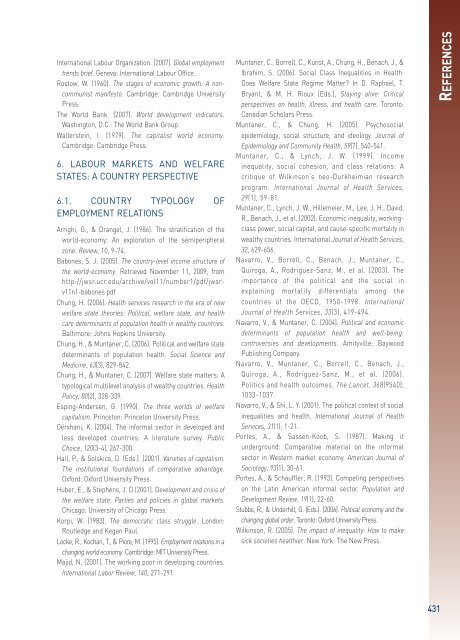Employmentweb_low
Employmentweb_low
Employmentweb_low
Create successful ePaper yourself
Turn your PDF publications into a flip-book with our unique Google optimized e-Paper software.
International Labour Organization. (2007). Global employment<br />
trends brief. Geneva: International Labour Office.<br />
Rostow, W. (1960). The stages of economic growth: A noncommunist<br />
manifesto. Cambridge: Cambridge University<br />
Press.<br />
The World Bank. (2007). World development indicators.<br />
Washington, D.C.: The World Bank Group.<br />
Wallerstein, I. (1979). The capitalist world economy.<br />
Cambridge: Cambridge Press.<br />
6. labour markets and welFare<br />
states: a country perspectIve<br />
6.1. country typoloGy oF<br />
employment relatIons<br />
Arrighi, G., & Drangel, J. (1986). The stratification of the<br />
world-economy: An exploration of the semiperipheral<br />
zone. Review, 10, 9-74.<br />
Babones, S. J. (2005). The country-level income structure of<br />
the world-economy. Retrieved November 11, 2009, from<br />
http://jwsr.ucr.edu/archive/vol11/number1/pdf/jwsrv11n1-babones.pdf<br />
Chung, H. (2006). Health services research in the era of new<br />
welfare state theories: Political, welfare state, and health<br />
care determinants of population health in wealthy countries.<br />
Baltimore: Johns Hopkins University.<br />
Chung, H., & Muntaner, C. (2006). Political and welfare state<br />
determinants of population health. Social Science and<br />
Medicine, 63(3), 829-842.<br />
Chung, H., & Muntaner, C. (2007). Welfare state matters: A<br />
typological multilevel analysis of wealthy countries. Health<br />
Policy, 80(2), 328-339.<br />
Esping-Andersen, G. (1990). The three worlds of welfare<br />
capitalism. Princeton: Princeton University Press.<br />
Gërxhani, K. (2004). The informal sector in developed and<br />
less developed countries: A literature survey. Public<br />
Choice, 120(3-4), 267-300.<br />
Hall, P., & Solskice, D. (Eds.). (2001). Varieties of capitalism.<br />
The institutional foundations of comparative advantage.<br />
Oxford: Oxford University Press.<br />
Huber, E., & Stephens, J. D.(2001). Development and crisis of<br />
the welfare state: Parties and policies in global markets.<br />
Chicago: University of Chicago Press.<br />
Korpi, W. (1983). The democratic class struggle. London:<br />
Routledge and Kegan Paul.<br />
Locke, R., Kochan, T., & Piore, M. (1995). Employment relations in a<br />
changing world economy. Cambridge: MIT University Press.<br />
Majid, N. (2001). The working poor in developing countries.<br />
International Labor Review, 140, 271-291.<br />
Muntaner, C., Borrell, C., Kunst, A., Chung, H., Benach, J., &<br />
Ibrahim, S. (2006). Social Class Inequalities in Health:<br />
Does Welfare State Regime Matter In D. Raphael, T.<br />
Bryant, & M. H. Rioux (Eds.), Staying alive: Critical<br />
perspectives on health, illness, and health care. Toronto:<br />
Canadian Scholars Press.<br />
Muntaner, C., & Chung, H. (2005). Psychosocial<br />
epidemiology, social structure, and ideology. Journal of<br />
Epidemiology and Community Health, 59(7), 540-541.<br />
Muntaner, C., & Lynch, J. W. (1999). Income<br />
inequality, social cohesion, and class relations: A<br />
critique of Wilkinson's neo-Durkheimian research<br />
program. International Journal of Health Services,<br />
29(1), 59-81.<br />
Muntaner, C., Lynch, J. W., Hillemeier, M., Lee, J. H., David,<br />
R., Benach, J., et al. (2002). Economic inequality, workingclass<br />
power, social capital, and cause-specific mortality in<br />
wealthy countries. International Journal of Health Services,<br />
32, 629-656.<br />
Navarro, V., Borrell, C., Benach, J., Muntaner, C.,<br />
Quiroga, A., Rodriguez-Sanz, M., et al. (2003). The<br />
importance of the political and the social in<br />
explaining mortality differentials among the<br />
countries of the OECD, 1950-1998. International<br />
Journal of Health Services, 33(3), 419-494.<br />
Navarro, V., & Muntaner, C. (2004). Political and economic<br />
determinants of population health and well-being:<br />
controversies and developments. Amityville: Baywood<br />
Publishing Company.<br />
Navarro, V., Muntaner, C., Borrell, C., Benach, J.,<br />
Quiroga, A., Rodríguez-Sanz, M., et al. (2006).<br />
Politics and health outcomes. The Lancet, 368(9540),<br />
1033-1037.<br />
Navarro, V., & Shi, L. Y. (2001). The political context of social<br />
inequalities and health. International Journal of Health<br />
Services, 31(1), 1-21.<br />
Portes, A., & Sassen-Koob, S. (1987). Making it<br />
underground: Comparative material on the informal<br />
sector in Western market economy. American Journal of<br />
Sociology, 93(1), 30-61.<br />
Portes, A., & Schauffler, R. (1993). Competing perspectives<br />
on the Latin American informal sector. Population and<br />
Development Review, 19(1), 22-60.<br />
Stubbs, R., & Underhill, G. (Eds.). (2006). Political economy and the<br />
changing global order. Toronto: Oxford University Press.<br />
Wilkinson, R. (2005). The impact of inequality: How to make<br />
sick societies healthier. New York: The New Press.<br />
RefeRences<br />
431



